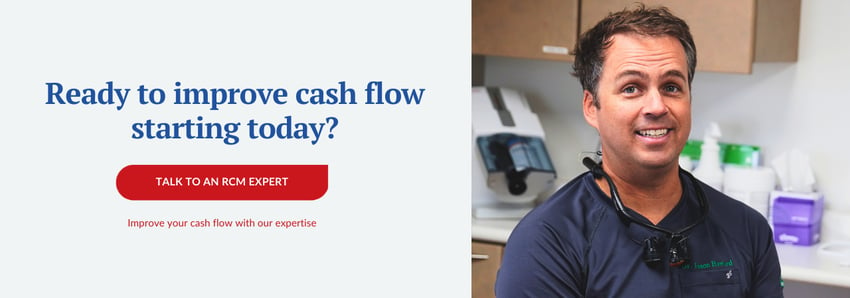Do’s and don'ts for a successful in-house dental biller


When you hire an in-house dental biller, you already have a pretty good idea of their previous experience. They should know how to appeal claims, work the aging report efficiently, and maintain a good collections percentage. These qualifications are a no-brainer, right?
But what about the more nuanced part of the dental biller’s job? Are they aware of how your processes work and what kind of structure they should add to their day? Do they understand the importance of continuous training on topics such as CDT or COB? How well will they work with your administrative team? Does this new biller know everyone’s role in the billing process?
All of these additional skills are crucial for maintaining a healthy dental practice.
As an outsourced dental billing company, Dental ClaimSupport is all about processes that will optimize a practice’s financial health. Our outsourced billers have to face these nuances the same way in-house billers do, and mastering the do’s and don’ts of being a successful dental biller can make or break the amount of revenue a practice brings in.
In this article, we will take you through those do’s and don’ts of being a successful in-house dental biller so that you and your biller can understand the need for clear and timely processes, a strategy for continuous training, and a collaborative mindset to divide up work with the administrative team.
These do’s and don’ts will help your in-house dental biller cultivate a streamlined and profitable billing process that the entire practice will benefit from. This article is meant to be shared with your new in-house biller in order to guide them towards success and profitability.
Do: Have a structured schedule for completing billing tasks
Your biller’s first priority is to figure out the process for getting their work done.
Everyone works differently and has a different system when it comes to the billing process. A good start is to explain to the biller what your current process is, what is and what isn’t working, and give the biller the ownership of taking it from there.
With their prior experience, they will be able to take your current process and make it their own in order to bring in as much money as possible from patient payments and insurance claims.
They should have a good idea of how often to create, batch, and submit claims after the treatment, how often to work the insurance aging report, follow up on unpaid claims, and how often to post payments. Creating a weekly routine for each of these tasks is how the biller can add structure to their position.
Don’t: Fly by the seat of their pants when it comes to what needs to be done
There’s a time and place for getting a job done on the fly, and dental billing is not one of them.
A good dental biller has a process for everything. If your new in-house biller comes in with no sense of when things should be done - you might need to have a conversation with them.
Everything about insurance billing specifically, is timely.
So making sure dental insurance claims are submitted no later than 2 business days after the treatment is crucial for getting them paid.
It can help to have a checklist of the dental billing process, but truly - if you’ve spent the money hiring a full-time, in-house dental biller, they should know how to move through the dental billing process with ease. Every part of the process should be done purposefully since every step depends on the previous one.
Do: Regularly research and stay up to date with the dental insurance industry
Dental insurance companies are constantly making it more difficult for claims to be paid after the first submission. So it’s the biller’s job to stay up to date with each insurance company your practice submits claims for.
They will also likely be responsible for knowing the fine-line details of different benefits for each patient. They might not necessarily be responsible for insurance verification, but if the person on your administrative team has questions about deductibles, maximums, or any other specific insurance benefit rule, they should be the go-to person for answers.
This means they are constantly seeking out resources to keep up with this information. To do this, you as the dentist should also be willing to support their continuous training.
Let your team members know that you value them and invest in them by enrolling them in training courses or webinars to keep up. Ask them to give a presentation to the team of what they have learned.
Don’t: Become complacent and have an “if it’s not broken don’t fix it” mentality
We’ve seen time and time again: in-house billers who just live to get the job done. And while that is important, it’s also crucial to have a big-picture mindset where they’re always looking to evolve and improve their processes.
Some billers can get stuck in their ways, which can lead to a lack of knowledge of insurance changes. This can cause claim denials and delayed payment from insurance companies.
And if your insurance coordinator’s lack of desire to learn is costing you - that’s a huge problem.

Do: Work collaboratively with the rest of your administrative team
As we mentioned above, someone else on the administrative team might be responsible for patient scheduling, which means they might also handle their eligibility status or insurance verification.
Or perhaps this means you have one person handling patient billing, while your recently hired in-house biller focuses on the insurance side of the billing process. Either way - having other team members help with the process will help with efficiency.
We understand the entire purpose of hiring an in-house biller is to handle the billing process, but there are small tasks in the process that the administrative team can help with that will let the in-house biller focus on the more tedious tasks such as creating claims, submitting the claims, and doing research on denied claims.
Efficiency is the key here - so making room for team members to help can create a more profitable dental billing process.
Don’t: Take on every single part of the billing process alone
Dental billers can get territorial about their processes, and feel like they just want to handle it on their own. And truly, they are accountable for seeing the dental billing process from start to finish. But that doesn’t mean they can’t have some help along the way.
Your administrative team is there for a reason. While you hire an in-house biller to take on the nitty-gritty of dealing with insurance, they can still use help with patient billing, insurance verification, and other parts of the billing process that require slightly less expertise.
Ready to have a streamlined and profitable dental billing process now that your team is in place?
A successful dental biller is strategic in how they perform each task in the billing process, is always craving more billing and insurance knowledge, and knows how to collaborate efficiently with the administrative team.
Once your new in-house biller understands these do’s and don’ts, they should be able to attack your dental billing process with ease.
If your in-house biller still struggles to meet any of these expectations, you can always utilize Dental ClaimSupport’s outsourced billing services. Our billers are also held to these standards or “do’s and don’ts.”
Once you have your team in place, you can focus on streamlining your dental billing process to be efficient and profitable. To learn more about how to build this process, visit our Learning Center at www.dentalclaimsacademy.com
Related Posts
Dental revenue resources from Dental Claim Support


